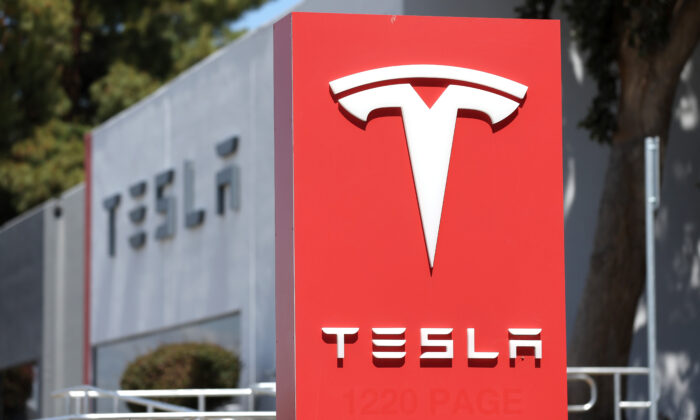Noted Tesla Analyst Sees Auto Pricing Power Shift From Dealers Toward Suppliers
A sign is posted in front of a Tesla service center in Fremont, Calif., on April 20, 2022. (Justin Sullivan/Getty Images)
Long-lasting global auto semiconductor chip shortages could ease sooner than expected on the back of strong foundry shipments, consumer electronics slowdown and China re-opening, Morgan Stanley analyst Adam Jonas said on Tuesday.
What Happened
The analyst who tracks automakers like Tesla Inc and Rivian Automotive Inc said that the new and used car prices are expected to enter a new phase as the market gets flooded with new chips.
The analyst says the move could shift the balance to pricing towards suppliers over dealers.
“We see improved supply chain availability as an underappreciated trigger for the transfer of value from those who have enjoyed pricing power on the down-stream to those who have had to face rising input costs and lower production upstream,” Jonas wrote in a note. “Like a rusty seesaw on a deserted playground… the balance will shift from dealers to suppliers.”
Why It Matters
The report comes close on the heels of world’s second-largest automaker Volkswagen Group’s CEO Herbert Diess saying that he sees an improvement in chip supplies.
Diess earlier this month said that he expects the automaker’s global production can recover in the rest of this year.
Automakers across the globe have been struggling with severe chip shortages that started in mid-2020 after demand sprung back quicker than expected leading to a supply chain mess.
Jonas said, while headlines suggest auto production is still being held up by semiconductor shortages, he does not believe so. “Since last October, Malaysia fabs are coming back and foundry production is catching up with demand.”
Taiwan Semiconductor Mfg Co—the analyst noted—accounts for about 50% of global auto MCU production and that it has seen significant improvements through the first quarter, with wafer foundry auto semi output up approximately 60 percent year-on-year.
By Rachit Vats
© 2022 The Epoch Times. The Epoch Times does not provide investment advice. All rights reserved.



